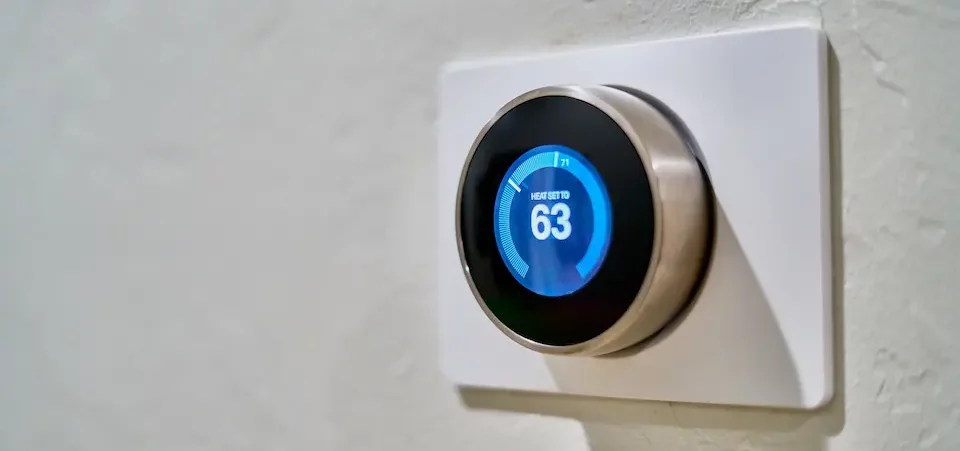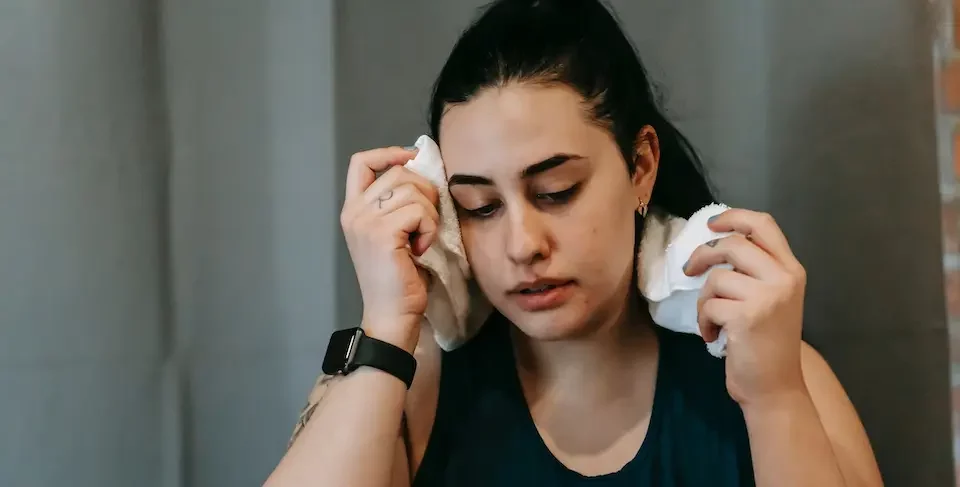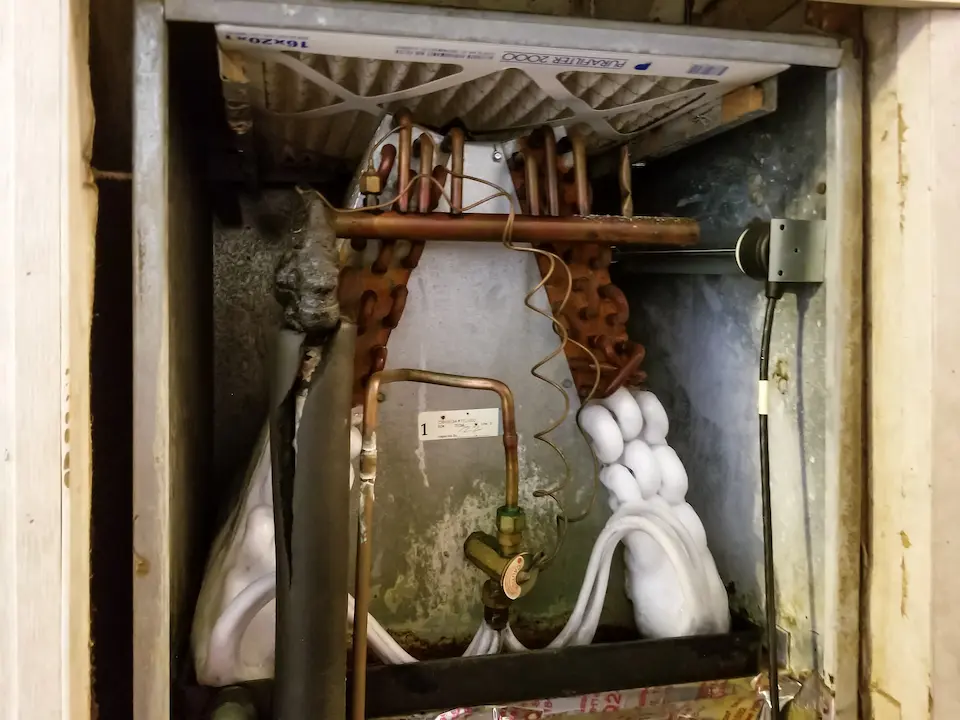July 20, 2023
Troubleshooting Guide: Why Is My AC Running But Not Cooling – Fixing Common Issues

When you have your central air conditioning system running, but it’s not cooling as it should, you’re left frustrated and overheated. Understanding what’s going on when your air conditioner is not working is key so that you know when it’s time to call in the professionals at Bowman Mechanical Services.
We are going to take a closer look at what keeps your ac running but not cooling, as well as some common DIY fixes. We’re also going to share some benefits of calling air conditioning repair professionals for repairs and preventative maintenance.

Understanding the Basics: How Does an Air Conditioner Work?
Your air conditioner’s cooling process consists of three main components: a compressor, a condenser coil, and an evaporator coil. These work together to convert the refrigerant from gas to liquid and back again.
The compressor raises the pressure and temperature of the refrigerant gas. This gets sent back to the condenser coil where it is converted to liquid. The refrigerant then goes back indoors and into the evaporator coil. The refrigerant evaporates and cools the indoor coil. A fan blows indoor air across the cold evaporator coil. The heat inside the home is absorbed into the refrigerant. The cooled air then gets circulated throughout the home while heated evaporated gas goes back outside to the compressor. This cycle continues until your home reaches the desired temperature.
Should I Turn Off My AC If It’s Not Cooling?
When you are experiencing air conditioner problems, it is helpful to turn the unit off. This will not only save energy but also allow you to safely look at the problem.
Common Causes of an AC Running but Not Cooling
Several issues can lead to your cooling system running but not actually cooling down your home.
Frozen Evaporator Coil
What causes an evaporator coil to freeze?
Insufficient airflow is one of the most common reasons for frozen evaporator coils. A clogged or dirty air filter, low fan speed, or backed-up drain clogs can all contribute to this problem.
Signs and symptoms of a frozen evaporator coil:
- Poor, ineffective cooling
- High energy costs
- Frost accumulating on the coils
Steps to troubleshoot and resolve a frozen coil issue:
- You can try to resolve a frozen coil issue by first giving the evaporator coils time to thaw. Shut off the unit at the circuit breaker. It can take up to 24 hours for the coils to completely thaw.
- You’ll also want to check the airflow to make sure there are no clogs in the air filters. While you’re doing this, be sure the evaporator coil is free of dust and debris. If you see anything, be sure to clean it off.
- Look around for any physical damage to the evaporator coil. Bent coils and dented pipes can lead to icing issues.
- Check refrigerant levels to be sure that there are no leaks.

Malfunctioning AC Unit
Identifying signs of a malfunctioning AC unit
If the airflow is not strong or your AC unit is blowing warm air, you could have a malfunctioning unit. If you notice that it takes longer to cool your home at the same temperature, you’ll want to see if your unit is running properly.
Possible causes of AC unit malfunction
- If your high-voltage wire is loose, disconnected, or damaged, your AC unit will not work properly.
- A faulty compressor can also cause an AC unit malfunction. The AC compressor is a necessary part for pressurizing the refrigerant and pushing it through the AC system. When the compressor doesn’t work, the refrigerant won’t transfer heat and your AC won’t cool down.
- A broken capacitor could lead to cooling problems. The capacitor stores electrical energy and releases it when the motor needs to start. If the capacitor fails, the outside AC unit won’t start up and cool your home.
- When there is a malfunctioning contactor, your AC won’t cool down properly. Damage or corrosion are both issues to be on the lookout for.
- Check the disconnect box near the outdoor condenser unit. If the wires in the disconnect are loose or damaged, your unit won’t be able to cool your home.
Troubleshooting steps to fix AC unit issues
- Check for a dirty air filter.
- Check your thermostat settings.
- Check your air conditioner circuit breakers.
- Check your outdoor unit.
- Check all air vents.
If you take these steps and still can’t determine what’s going on, you’ll want to call the professionals at Bowman Mechanical Services to survey the problem.
DIY Fixes for an AC Running but Not Blowing Cold Air
Air Filter Maintenance
When your AC is running but not blowing cold air, check the air filters. If they are clogged, they’ll cause your home to not cool properly. Faulty air filters can also trigger the unit to shut down completely.
Thermostat Settings and Calibration
If your AC unit is running but not cooling check the thermostat settings. Make sure the temperature is set to cool. Look to see that the thermostat hasn’t been adjusted.
Insufficient Airflow
When there is insufficient airflow, there may be blocked ducts or filters. Look to see if there is anything that is prohibiting proper airflow. If it seems as though there are no blockages and you still have air conditioning problems, it’s time to call the professionals.
Clearing Debris around the AC Unit
Debris around the AC unit can certainly lead to the air conditioner not cooling properly. Check the condenser coil for clogs. Dirt, grass, and other airborne particles can get into the coils and lead to airflow issues.
A dirty coil can lead to lower energy efficiency, loss of cool air at the register, or a full system shutdown. A clogged condenser can cause your air conditioner to run but not drop the temperatures inside.
Clearing dirt, properly vacuuming the coil with a brush attachment, or softly rinsing the coil with a hose can help to clean the coils.
When to Call a Professional
If you’ve tried several troubleshooting techniques or have tried to fix a problem yourself with no success, it’s time to call in the professionals. This is not only the best way to get the problem fixed, but also the safest.
Benefits of Professional AC Maintenance and Repairs
If you want your air conditioner running properly, it’s best to call a high-rated HVAC technician to identify and fix the issue. They have the necessary experience to get the job done right. They will not only fix the obvious repairs but can also detect other problems you may not have even noticed.
Professional HVAC technicians are also licensed and insured and follow safety standards. They also often offer warranties or guarantees on their work should a problem arise.
Air Conditioner Problems? Contact the Professionals at Bowman Mechanical Services
If you’re having problems with your air conditioning system, call the professionals at Bowman Mechanical Services. Our experienced HVAC technicians have experience with many different air conditioning systems and can handle many air conditioning repairs. Call us today at [phone] to schedule an appointment!

